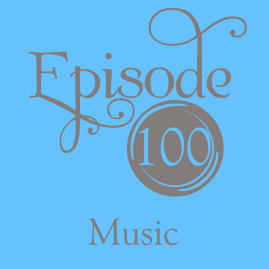
Listen Now:
“Does it, or does it not, make any appreciable difference to a baby to be in a home where music is part of the every-day life, where it is put to sleep with simple songs, where cheerful little musical games are introduced in their natural place, where it is led to find rhythmical expression in dances and songs, and where it hears much beautiful sound which it docs not attempt to account for or understand ? I think that all teachers of experience will agree that it does make an enormous difference, and that it is possible to pick out from a roomful of children, by their very bearing, those who come from homes where music exists.” (Holland, “Music as an Educational Subject” Parents’ Review)
“Some of the most important habits for a child to acquire, are (1) observation ; (2) concentration ; (3) imagination ; and (4) reasoning. … [and Music] trains simultaneously, as no other single subject does, ear, eye, and hand, it awakens and naturally develops the imagination, and insists upon concentration and reasoning.” (Holland)
” Music is the language of the soul, but it defies interpretation. It means something, but that something belongs not to this world of sense and logic, but to another world, quite real, though beyond all definition. … Is there not in music, and in music alone of all the arts, something that is not entirely of this earth ? Whence comes melody ? Surely not from anything that we hear with our outward ears and are able to imitate, to improve, or to sublimise. . . . Here if anywhere, we see the golden stairs on which angels descend from heaven and whisper sweet sounds into the ears of those who have ears to hear. . . .” (Holland)
“Training of the Ear and Voice is an exceedingly important part of physical culture, which began with basic enunciation, and French lessons. She also pointed out that that every child may be, and should be, trained to sing through carefully graduated ear and voice exercises, to produce and distinguish musical tones and intervals.” (Vol. 1, p. 133)
“If possible, let the children learn from the first under artists, lovers of their work: it is a serious mistake to let the child lay the foundation of whatever he may do in the future under ill-qualified mechanical teachers, who kindle in him none of the enthusiasm which is the life of art.” (Vol. 1, p. 31)
“Intelligent love of music is one of the great joys and privileges of life, but it is denied to quite half the community, and I would argue that the cultivation thereof is in its way quite as important as technical instrumental instruction, as it is one of the greatest factors in elevating mankind.” (A Musical Baby, Mrs. Glover, Parents’ Review)
The Child Pianist–Teacher’s Guide (Curwen Method)
Listener’s Guide to Musics, Scholes
Second Book of Great Musicians, Scholes
*The Planets, Sobel
The Growth of Music, Colles
Elements of Music, Davenport
Studies of Great Composers, Parry
Enjoyment of Music, Pollitt
Musical Groundwork, Shera
(*Affiliate Links)
Episode 76: Drill and Physical Training
Heidi Buschbach’s Articles on CMP (Here and Here)
Sabbath Mood Homeschool’s Middle School Astronomy Guide




This 100th podcast on Music has been one of the most touching for me. While the others have literally transformed our family and home, this one touched my heart in a special way (and I know it will also be transformational). I did actually grow up in a musical home, so hearing about the role of a musical presence in the home and its effect on children and their bearing struck a chord with me (pardon the pun). While the music played in my home was mostly gospel and R&B, I began to play an instrument in elementary school and continued in band and orchestra through college. This is when I received an introduction to classical music and jazz (for flute). I remember how I would just sit and close my eyes and would feel transported by the music whether it was as part of the orchestra, at home practicing, or hearing a symphony or opera. It has been amazing to reconnect with many classical pieces through the Charlotte Mason journey we’ve begun with our children while continuing our listening to and singing of a wide variety of other music genres (I can only think of 2-3 genres that we prefer to avoid). I have seen glimpses that my children have “caught” the love of making music as well. There are many times when I have to literally turn the music off and quiet someone whistling, humming, or singing, so that we can simply enjoy the sound of silence for a few moments in the day. This is one of the areas within the Charlotte Mason education in which I am so elated to already come knowing the benefits first hand and found both my heart and head nodding a “yes” at every single idea presented. My heart smiles at the thought that there are parents who feel similarly in other areas of their familiarity and interest I’m sure. Thank you so much for this journey down memory lane as well as a look forward to the future for our family in this area!!